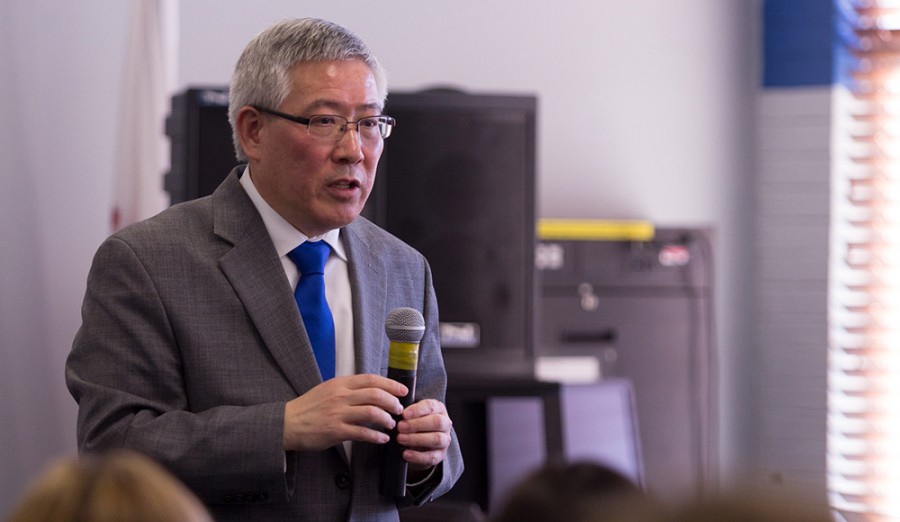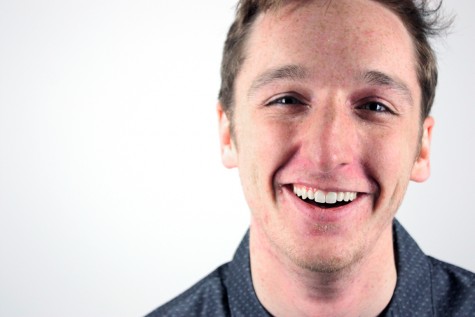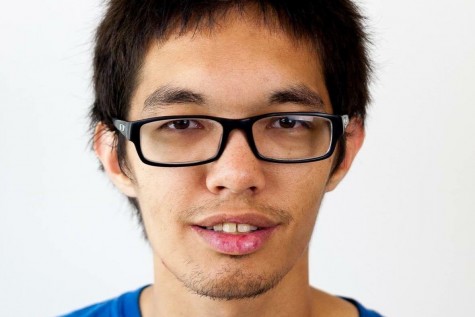Huang builds career through 2 countries
Guiyou Huang, currently the senior vice president at Norwich University and a candidate for Eastern president, speaks to faculty during the open faculty forum on Feb. 4 in the Arcola-Tuscola Room of the Martin Luther King Jr. University Union.
February 5, 2015
This is the fourth and final installment in a series of articles profiling each of the four finalists in the search for Eastern’s next president.
Guiyou Huang, who lived much of his early academic life in China, learned quickly that education varied drastically from country to country.
Moving to the U.S. in August to continue his graduate studies at Texas A&M University, Huang said he noticed major differences in how American education is taught and how Chinese education is taught.
He mentioned China’s latest push to strengthen math and sciences is more aggressive than in the U.S.
“American education is more hands-on with more questions on critical thinking,” he said.
He added China stakes a lot of importance on memorization.
He said these different and broad perspectives have given him the ability to see differences normally not seen like with testing.
He said college examination systems differ between the two countries in that China only offers the ability to take the exam once every year.
He said he has learned a lot from his life in China, not just through studies, but through the social changes of the time. One of the most notable times in China was in the last few months he stayed in China, during the Tiananmen Square protests.
At the time, Huang, a 26-year-old student, was studying at Beijing University, when growing protests calling for a more democratic China — a different China.
“Beijing University was the nervous center of the student’s movement,” Huang said.
He said they were unfortunate times, but unlike some of his colleagues at the time, he stayed in Beijing.
For the most part though, the most of the students on campus were involved in the protests. He said he was actually in Tiananmen Square three times. He remembered he got very sick one time he went.
“The sanitation was terrible in the Square,” he said.
He said it got violent around June, where there were some killings.
“The students, me, many or my friends and colleagues wanted a better China, wanted a cleaner more just government, better benefits for the workers in the factories,” Huang said.
He said the students wanted more freedoms and more openness.
He said his witnessing the largest degree of openness, freedom of the press, and freedom of speech sticks out when remembering those times.
He added, everyone including factory workers and students just showed a genuine love and care for the country and its betterment during that time.
Overall, it was a memorable experience for him, he said. He saw many pulled off campus bloody and even saw friends injured.
“A lot of things stood out,” he said.
Moving into the U.S., Guiyou Huang continued his studies in education, which he said he had a great abundance of passion for.
“There are a lot of important things in the world, but not all things have the same equal amounts of importance,” Huang said. “For example, the profession of education is very important because civilization depends on how well we educate future generations.”
He has spent much of his life in an academic environment. He got a baccalaureate degree in English at Qufu Normal University in China, the birthplace of Confucius. He received a graduate studies completion diploma in English from Beijing University.
Once in the U.S., he received a doctorate degree at Texas A&M.
He then went on to work in the field as the Director of the honors program at Kutztown University in Pennsylvania. He also worked as honors college director at Grand Valley Sate University in Michigan.
He then moved on to become the dean of the Biscayne College of liberal arts and social sciences St. Thomas University in Florida.
His last stop ended him at Norwich where he moved up to the vice president for academic affairs.
Huang said he his hopes and focuses for Eastern revolved around enrollment and providing more resources, which he said go hand-in-hand by seeking other venues from which to look for students, not solely in Illinois.
He said Illinois is important when seeking students, but it is important to diversify the campus whether with other national or international students.
He also wants to focus his efforts on enhancing academics so it stands out from other schools. He added it was important to find innovative ways to teach programs offered at Eastern.
One way this could be achieved would be enhancing the universities use of high impact practices such as the study abroad program.
He added it was especially important to focus on diversity on campus. Huang mentioned that he received many questions on the subject. It is important the university and the community have clear communication and that there is a dialogue between the two.
He also stressed it is important to diversify the campus on a educational level ad not just on a politically correct level.
He said it is important to have students exposed to all sorts of cultures and people.
He wished to assist with the already strong strategic plan, which is in place, Huang said.
He added he hopes to grow Eastern’s resources in order to help with that.
“You need resources to make good ideas happen,” he said.
Jarad Jarmon can be reached at 581-2812 or [email protected].



















































